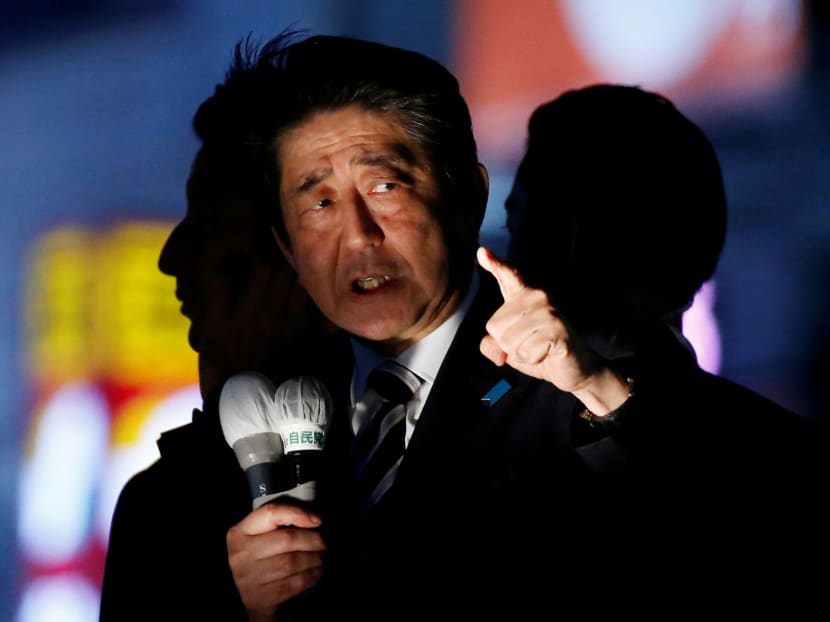Abe set for victory in Japan election as opponents bicker
TOKYO — Japanese Prime Minister Shinzo Abe's early election gamble looks like it will pay off.

Japan's Prime Minister Shinzo Abe, leader of the Liberal Democratic Party, speaks at an election campaign rally in Tokyo, Japan. Photo: Reuters
TOKYO — Japanese Prime Minister Shinzo Abe's early election gamble looks like it will pay off.
Only a few months ago his popularity tumbled over a series of cronyism scandals, prompting some allies to weigh challenging him as party leader. Then a cabinet reshuffle and North Korean missile launches over Japan helped stop the bleeding, giving him a window to secure a fresh mandate that could end up making him the country's longest-serving prime minister.
Polls show Mr Abe sailing to an easy victory in Sunday's (Oct 22) election, potentially putting him on track to govern Japan until 2021 if he wins a party leadership vote next year. Retaining his two-thirds majority in parliament would boost his chances of changing Japan's pacifist constitution, as well as approving gambling resorts and pushing forward with a sales tax increase.
A convincing victory would also keep in place the ultra-easy monetary policy that weakened the yen, propped up exports and helped stocks rise to heights not seen since before the financial crisis. Diplomatic policies, including cosying up to President Donald Trump to keep the US alliance strong in the face of North Korea's threat, will also be maintained.
For a while, it looked as if Tokyo Governor Yuriko Koike might pose a serious threat to Abe. Her new Party of Hope quickly gained popularity, and took in a wave of disaffected opposition lawmakers. Then the new Constitutional Democratic Party formed, and has risen to become the second most popular opposition group in most polls.
"They will maintain their majority easily, but that is because of the split opposition," Tsuneo Watanabe, a senior research fellow at the Sasakawa Peace Foundation in Tokyo, said of Mr Abe's coalition. "I don't think it will feel like a victory."
A survey published by the Nikkei newspaper on Friday forecast the LDP would win between 210 and 306 of the 465 seats up for grabs, while its coalition partner Komeito would secure 32-38. The paper's most likely scenario gives the alliance 297 seats, short of the 310 needed for a two-thirds majority.
Even so, Mr Abe's own popularity is shaky. His support fell to 38 per cent in a poll published by the Asahi newspaper on Thursday, compared with 40 per cent two weeks before and 54 per cent in January.
At a campaign stop in central Tokyo Wednesday night, Mr Abe received a mixture of cheers and jeers from onlookers in the crowd. He detailed his close relationship with Mr Trump and cited jumps in stock prices and the value of public pensions among his achievements.
"This is an election about how we can defend our country from the North Korean threat," Mr Abe told the crowd. "It's also about how we can develop a future for our children."
CONSTITUTION CHANGE
When Mr Abe called the election last month, he said he wanted to test public opinion on a plan to divert some of the revenues from a planned increase in the consumption tax to reduce education costs for low-income households.
Some of his other priorities are more controversial. A plan for Singapore-style casino resorts has generated excitement among overseas investors, but is opposed by much of the electorate.
Even more divisive is Mr Abe's bid to revise Japan's 70-year-old constitution, one of the LDP's founding principles. A poll published by the Asahi newspaper Thursday showed 37 per cent of respondents approved of the plan and 40 per cent disapproved.
In May, Mr Abe proposed an amendment that would keep in place Article 9 — under which Japan renounced the right to wage war or maintain military forces — while adding language to affirm the legality of Japan's Self-Defence Forces. He backtracked from a plan to change the constitution by 2020 after a drop in public support, and now says there's no timeframe for the move, which would need to pass a public referendum.
WEAK OPPOSITION
The most vocal opponents are in the CDP, which was formed almost by chance after the main opposition Democratic Party split up when more conservative members joined Koike's party. Its policy platform calls for raising the minimum wage and redistributing income through tax changes.
"It's not about left and right," Yukio Edano, the CDP's leader, told a cheering crowd in a stump speech last week in Tokyo. "Don't you feel that policy and democracy are being imposed on you from above? We need democracy supported by the grassroots. We need to revive the economy from the bottom."
Japan's opposition parties have long been weakened by infighting and failed to establish broad support, according to Gerald Curtis, an emeritus professor at Columbia University and author of several books on Japanese politics. The LDP has governed Japan for all but a handful of years since the 1950s.
"The LDP has always spread a very wide net across Japanese society, basically offering something for everybody," Mr Curtis said. "Pragmatism has been a source of their success." BLOOMBERG






